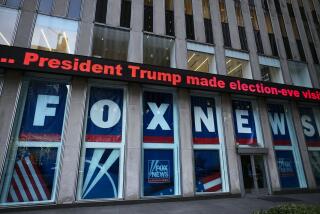Firms Allowed to Countersue Whistle-Blowers : Law: General Dynamics can reinstate claims against employees who alleged false test results.
- Share via
SAN FRANCISCO — Whistle-blowers who sue their employers for defrauding the federal government can be countersued for damages if they can’t prove their case, a federal appeals court ruled Tuesday.
The U.S. 9th Circuit Court of Appeals allowed General Dynamics Corp. to reinstate claims against five employees whose 1988 lawsuit accused the company of ordering false test results while working on Navy missile systems.
The company’s counterclaims include accusations that the employees faked the tests and defrauded and libeled General Dynamics. The court said those claims could be pursued if the company was cleared of fraud in an upcoming trial.
It was the court’s second ruling in two weeks on a Civil War-era law known as qui tam, which allows private citizens to sue federal contractors for allegedly defrauding the government and to share in the damages.
The government has the option of taking control of the case and litigating it, but chose to stay out of the General Dynamics suit.
On Sept. 7 a different panel of the court ruled that the current version of the law, passed in 1986, is constitutional. The court rejected claims by Boeing Co. that the law improperly allowed private citizens to sue in the name of the government and intruded into presidential powers.
General Dynamics, joined by other aerospace giants, raised the same challenge in the current case, but the court rejected it with a brief reference to last week’s ruling. Herbert Fenster, a lawyer for General Dynamics, said the company will appeal to the U.S. Supreme Court.
Fenster was pleased with the rest of the ruling, however, saying the appeals court adopted the company’s position on countersuits.
“It somewhat more levels the playing field,” he said. “I think it should help to discourage false qui tam actions. . . . It’s an appropriate limit on malfeasance by an employee.”
Herbert Hafif, a lawyer for the employees who sued the company, said the effectiveness of the qui tam law as a weapon against fraud will be lessened by allowing contractors to countersue.
“This tactic of counterclaiming against a usually impoverished whistle-blower is just one more chilling deterrent to moving ahead with these lawsuits,” he said. “The bargaining power between a plaintiff and a defendant in this instance is between David and Goliath.”
More to Read
Inside the business of entertainment
The Wide Shot brings you news, analysis and insights on everything from streaming wars to production — and what it all means for the future.
You may occasionally receive promotional content from the Los Angeles Times.










